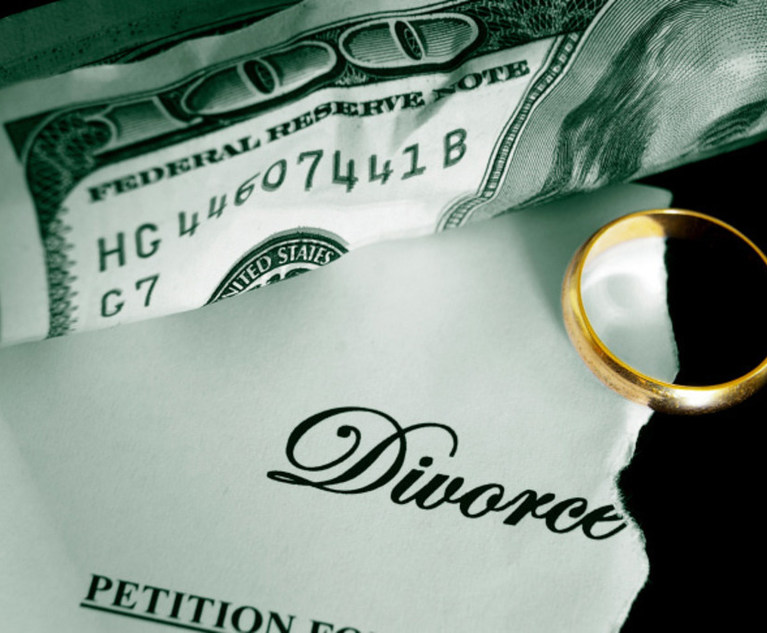Proposed Legislation Solves for 'Black Hole' Litigation Spawned When a Divorce Litigant Dies
If the Senate ultimately passes the bill, decades of "black hole" litigation will come to a close and the issue will no longer plague divorce litigants and estates of divorce litigants in the event a divorcing party dies.
January 17, 2023 at 10:00 AM
9 minute read
 photo credit: zimmytws
photo credit: zimmytws
What Is a 'Black Hole' Case?
New Jersey statute (N.J.S.A. 3B:8-1) guarantees a married individual a share of their spouse's assets upon that spouse's death (elective share). Separately, N.J.S.A. 2A:34-23 also guarantees divorcing spouses the right to fair distribution of marital assets upon divorce (equitable distribution). Once a married person commences divorce litigation, however, the right of both spouses to an "elective share" of a decedent spouse's assets is terminated by law; yet, if a spouse passes away while divorce litigation is pending, current law also deprives the surviving spouse the right to equitable distribution of marital assets. Thus, a spouse's death during divorce litigation precludes the surviving spouse the benefit of both the "elective share" and "equitable distribution" of marital assets, leaving the surviving spouse in a legal "black hole" as to the decedent spouse's assets.
In response to several decades of litigation in "black hole" cases, the New Jersey Assembly recently passed Assembly Bill A2351 on Oct. 27, 2022. The bill intends to solve the legal conundrum by permitting courts to effectuate equitable distribution of assets in pending divorce matters despite the death of a divorce litigant. The bill also reaffirms that a divorcing surviving spouse is not entitled to an elective share of a decedent spouse's estate. Bill A2351 moved to the Senate as Senate Bill S2991 on Nov. 3, 2022, where it is presently pending in the Senate Judiciary Committee.
Early 'Black Hole' Litigation
In one of the earlier, more notorious "black hole" cases, Jacobson v. Jacobson, 146 N.J. Super. 491 (1976), a husband allegedly killed his wife while their divorce was pending. The husband moved to abate the divorce in its entirety, including the wife's claims for equitable distribution and alimony. While the court granted abatement for the divorce cause of action and alimony claim, it added the wife's estate to the divorce litigation and declined to dismiss her claim for equitable distribution. In so doing, the court invoked the equitable maxim that a "wrongdoer should not profit by his own wrong." While Jacobson is the most infamous case on this particular topic given the murder, it is important to highlight the court's emphasis on the extraordinary circumstances in applying the equity maxim to permit the divorce matter to continue for purposes of litigating the equitable distribution claim after the death of a divorce litigant.
This content has been archived. It is available through our partners, LexisNexis® and Bloomberg Law.
To view this content, please continue to their sites.
Not a Lexis Subscriber?
Subscribe Now
Not a Bloomberg Law Subscriber?
Subscribe Now
NOT FOR REPRINT
© 2025 ALM Global, LLC, All Rights Reserved. Request academic re-use from www.copyright.com. All other uses, submit a request to [email protected]. For more information visit Asset & Logo Licensing.
You Might Like
View All
Reminder: Court Rules and Statutes Apply to Pendente Lite Custody Decisions
8 minute read
Attorney of the Year Finalist: Matheu Nunn's Supreme Court Successes
Law Firms Mentioned
Trending Stories
- 1Lawsuit Against Major Food Brands Could Be Sign of Emerging Litigation Over Processed Foods
- 2Fellows LaBriola LLP is Pleased to Announce that Alisha Goel Has Become Associated with The Firm
- 3Law Firms Turn to 'Golden Handcuffs' to Rein In Partner Movement
- 4Friday Newspaper
- 5Public Notices/Calendars
Who Got The Work
J. Brugh Lower of Gibbons has entered an appearance for industrial equipment supplier Devco Corporation in a pending trademark infringement lawsuit. The suit, accusing the defendant of selling knock-off Graco products, was filed Dec. 18 in New Jersey District Court by Rivkin Radler on behalf of Graco Inc. and Graco Minnesota. The case, assigned to U.S. District Judge Zahid N. Quraishi, is 3:24-cv-11294, Graco Inc. et al v. Devco Corporation.
Who Got The Work
Rebecca Maller-Stein and Kent A. Yalowitz of Arnold & Porter Kaye Scholer have entered their appearances for Hanaco Venture Capital and its executives, Lior Prosor and David Frankel, in a pending securities lawsuit. The action, filed on Dec. 24 in New York Southern District Court by Zell, Aron & Co. on behalf of Goldeneye Advisors, accuses the defendants of negligently and fraudulently managing the plaintiff's $1 million investment. The case, assigned to U.S. District Judge Vernon S. Broderick, is 1:24-cv-09918, Goldeneye Advisors, LLC v. Hanaco Venture Capital, Ltd. et al.
Who Got The Work
Attorneys from A&O Shearman has stepped in as defense counsel for Toronto-Dominion Bank and other defendants in a pending securities class action. The suit, filed Dec. 11 in New York Southern District Court by Bleichmar Fonti & Auld, accuses the defendants of concealing the bank's 'pervasive' deficiencies in regards to its compliance with the Bank Secrecy Act and the quality of its anti-money laundering controls. The case, assigned to U.S. District Judge Arun Subramanian, is 1:24-cv-09445, Gonzalez v. The Toronto-Dominion Bank et al.
Who Got The Work
Crown Castle International, a Pennsylvania company providing shared communications infrastructure, has turned to Luke D. Wolf of Gordon Rees Scully Mansukhani to fend off a pending breach-of-contract lawsuit. The court action, filed Nov. 25 in Michigan Eastern District Court by Hooper Hathaway PC on behalf of The Town Residences LLC, accuses Crown Castle of failing to transfer approximately $30,000 in utility payments from T-Mobile in breach of a roof-top lease and assignment agreement. The case, assigned to U.S. District Judge Susan K. Declercq, is 2:24-cv-13131, The Town Residences LLC v. T-Mobile US, Inc. et al.
Who Got The Work
Wilfred P. Coronato and Daniel M. Schwartz of McCarter & English have stepped in as defense counsel to Electrolux Home Products Inc. in a pending product liability lawsuit. The court action, filed Nov. 26 in New York Eastern District Court by Poulos Lopiccolo PC and Nagel Rice LLP on behalf of David Stern, alleges that the defendant's refrigerators’ drawers and shelving repeatedly break and fall apart within months after purchase. The case, assigned to U.S. District Judge Joan M. Azrack, is 2:24-cv-08204, Stern v. Electrolux Home Products, Inc.
Featured Firms
Law Offices of Gary Martin Hays & Associates, P.C.
(470) 294-1674
Law Offices of Mark E. Salomone
(857) 444-6468
Smith & Hassler
(713) 739-1250








